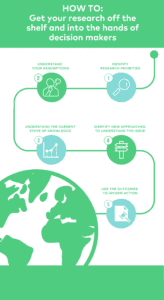Academics informing action: How do you get your research off the shelf and into the hands of decision-makers?
20 July 2020Researchers around the globe churn out thousands of published, peer-reviewed articles each year, often uncovering nuances about the world and innovations for life within it. Yet many of these findings never reach the desks of the people who could do something with it—be they business executives, government policy makers, or civil society leaders. There is a big disconnect between science-based researchers and on-the-ground decision-makers, resulting in a missed opportunity for better informed decisions. Furthering the problem, most researchers lack incentives to conduct research relevant to decision-makers. With that in mind, we ask:
How can academic researchers ensure that their outcomes are communicated and disseminated in a manner that reaches decision-makers and “do-ers” to effect real change?
At Meridian Institute, we are connecting researchers and practitioners—companies, producers, and the people who support them—to design and share research to address this gap. The Supply Chain Sustainability Research Fund supports research and dialogue to inform action that strengthens the sustainability of the food you eat and the clothes you wear.
Interested in how research can be better applied? Below are some key insights from the Research Fund:
- Identify research priorities. To prioritize research topics, we wanted to understand what questions were most important to companies looking to improve their sustainability practices and the NGOs and sustainability-focused organizations who support them. Meridian convened 50 experts from civil society, companies, the finance sector, and research institutions to develop a shared list of research priorities.
- Understand your assumptions. We often carry assumptions about how certain approaches or initiatives “work” to achieve their desired outcomes. However, these assumptions are rarely universal, and we don’t always articulate them when designing research. To better understand supply chain sustainability and identify research gaps, Meridian supported diverse groups to co-create a Theory of Change to illuminate how actions like company commitments to end deforestation or source sustainable products might achieve sustainability goals. The resulting Theory of Change highlights where additional research might be particularly helpful in understanding system dynamics and testing assumptions.
- Understand the current state of knowledge. Taking stock of existing research can be a helpful next step in understanding the dynamics in the Theory of Change and supporting more targeted future research. The Research Fund supported studies that explored recent articles and interviewed supply chain actors to understand what is currently known and where there are still gaps in our understanding of the effectiveness and impacts of supply chain sustainability initiatives.
- Identify new approaches to understand the issue. While literature reviews may help uncover what is known scientifically or academically on a topic, there are other perspectives that may be missing or research methodology that has not been attempted that could offer additional insights. The Research Fund supported additional research that included interviews with producers, corporate actors, and support networks to understand how supply chain sustainability initiatives are implemented. Other research used data in new ways to question long-held beliefs about how these approaches lead to desired outcomes.
- Use the outcomes and products to inform action. For research to lead to changes in policy or management approaches, the outcomes must be communicated in a way that decision-makers and others can easily understand the implications for their work. Meridian hosted the Supply Chain Sustainability Research and Learning Symposium, a series of webinars and virtual meetings that brought together researchers, corporate leaders, philanthropic donors, nonprofit organizations, and others, with the aim of bridging the gap between research and action.

Have you found that your research just sits on a shelf and never seems to have a real-world application? Or perhaps you would like more accessible science-driven research to inform your work. The insights and process outlined above, while described in the context of supply chain sustainability, could serve as a template for effective research and ultimately bridge the gap between research and application.

2020 Supply Chain Sustainability Research and Learning Symposium
Check out the new research findings and action-oriented insights generated at the Symposium.